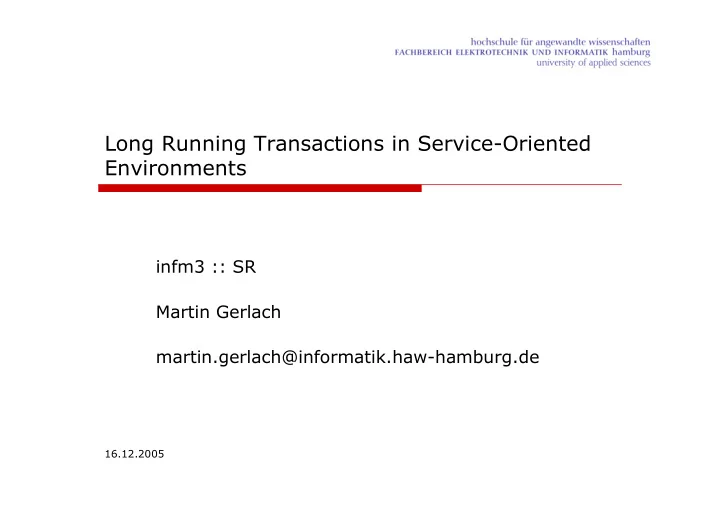

Long�Running�Transactions�in�Service�Oriented� Environments infm3�::�SR Martin�Gerlach martin.gerlach@informatik.haw�hamburg.de 16.12.2005
Need�for�consistency�of�business�critical�data … as�always,�across�evolving�technologies � Combination�of�coordination/composition�techniques� � (workflow)�[since�early�90ies]�with�loosely�coupled� services�[this�decade] Distributed�applications�[since�"sometime�long�ago"] � Mobile�applications�[more�and�more,�recently] � EAI�+�B2B � Services/SOA/<insert�more�buzzwords�here>�fit�well � Nothing�groundbreakingly new,�but�successful�application� � in�numerous�projects Many�lessons�learnt � 16.12.2005 infm3�::�SR�::�Long�Running�Transactions�...�::�Martin�Gerlach 2
Noteworthy�historical�facts�(1) 6000�years�ago,�Sumer:� � Royal�inventory�of�taxes,� land,�grain,�cattle,�etc.�on� clay�tablets Records�kept�for�every� � transaction …�papyrus,�…,�paper�… � 1890�use�of�punch�card� � system�to�report�US�census� by�Herman�Hollerith From�≈�1950 � Batch�(offline)�transactions � Followed�by�online� � transactions�(OLTP) 16.12.2005 infm3�::�SR�::�Long�Running�Transactions�...�::�Martin�Gerlach 3
Noteworthy�historical�facts�(2) Jim�Gray,�1981:� The�Transaction�Concept�– Virtues�and�Limitations Purpose:�There�are�no�"perfect�systems",�so�we�need�to�make�"almost� � perfect"�systems�safe(r),�i.e.�fault�tolerant ACID�Transactions:�Activities�composed�of�actions�of�different�criticality � Realization:�Update�in�place,�Time�Domain�Addressing,�Logging�and� � Locking,�UNDO/REDO,�etc. First�undo/redo�log:�Hänsel and�Gretel� ☺ … also�first�log�failure � Limitations � Nested�Transactions � ����������������������� � Transparent�integration�into�programming�languages � Peter�Principle:�"Every�idea�is�generalized�to�its�level�of�inapplicability" � 16.12.2005 infm3�::�SR�::�Long�Running�Transactions�...�::�Martin�Gerlach 4
Thesis�outline�::�Where�are�we�today? Working�title� ������������������������������ Thesis � ������������������������������ ����������� Outline � SOA:�From�objects�to�components�to�services:������������� � �� Why�services? Distributed�transactions�in�component�frameworks� � Why�long running�transactions?� � AW1 Existing�specs�and�ongoing�research�work � Conceptual�design�of�a�framework�that�supports� � �� /PJ coordination�and�long�running�transactions Breaking�down�the�(somewhat�overloaded)�Web�Services� � related�specs�and�the�design�to�the�essential�concepts Aim�at�performance � Aim�at�limited�resources�(mobile�devices) � Prototyping�(Web�Services) � PJ 16.12.2005 infm3�::�SR�::�Long�Running�Transactions�...�::�Martin�Gerlach 5
SOA:�Why�services? What�is�needed? � Coarse�granulation � Loose�coupling � Asynchronous�(and�reliable)�messaging � Abstraction�from�underlying�transport�and�implementation � Standards � Can�previously�existing�architectures�provide�this? � Function�libraries�and�packages � Classes�/�Objects � Components � 16.12.2005 infm3�::�SR�::�Long�Running�Transactions�...�::�Martin�Gerlach 6
SOA:�Why�services?�::�Classes�and�Components ������� ���������� Fine�granulated Coarse�granulated Described�by�interface Described�by�interface,� deployment�descriptor,�contract Object�oriented Need�not�be�OO Stateful (instance�vars) "No"�persistent�state Tight�coupling� Loose�coupling Stand�alone ��� � "Component�– Contract�– Container"�runtime�environment Problem�domain�specific� ���������� ,�separate�from� ��������� ,�few�well�known business�logic,�some�well�known MFC,�STL,�… CORBA,�EJB,�JavaBeans,�.NET,� COM 16.12.2005 infm3�::�SR�::�Long�Running�Transactions�...�::�Martin�Gerlach 7
SOA:�Why�services?�::�Conclusions Mapping�of�Services�to�Components � Interface � QoS requirements � Semantics � "Live"�in�managed�environment�(≈Container) � Services�additionally�provide � Abstraction�from�implementation� � Abstraction�from�transport�and�encoding � Interoperability�through�standards� � At�least�a�good�idea � � Web�Services�architecture�specifications�provide�a� framework�for�realization�of�SOAs 16.12.2005 infm3�::�SR�::�Long�Running�Transactions�...�::�Martin�Gerlach 8
SOA:�Web�Services�Framework 16.12.2005 infm3�::�SR�::�Long�Running�Transactions�...�::�Martin�Gerlach 9
Thesis�outline�::�Where�are�we�today? Working�title� ������������������������������ Thesis � ������������������������������ Outline � ����������� SOA:�From�objects�to�components�to�services:������������� � �� Why�services? Distributed�transactions�in�component�frameworks� � Why�long running�transactions?� � AW1 Existing�specs�and�ongoing�research�work � Conceptual�design�of�a�framework�that�supports� � �� /PJ coordination�and�long�running�transactions Breaking�down�the�(somewhat�overloaded)�Web�Services� � related�specs�and�the�design�to�the�essential�concepts Aim�at�performance � Aim�at�limited�resources�(mobile�devices) � Prototyping�(Web�Services) � PJ 16.12.2005 infm3�::�SR�::�Long�Running�Transactions�...�::�Martin�Gerlach 10
TX�management�fundamentals ����������������������������� � A�whole�application � Distributed�(logically,�physically,�geographically) � Heterogeneous � With�stringent�QoS requirements � �������������� ! � A�collection�of�operations�on�the�physical�and�abstract�application� � state Specifies�failure�semantics�for�computation�through�ACID� � properties �����������������������"�����������"������! � A�collection�of�core�services�that�manage�and�coordinate� � transactions TX�manager,�"RPC"�manager,�[Logging,]�[Locking,]�… � ���������"������ � Data,�code,�processes�providing�access�to�shared�data � Provides�ACID�operations � 16.12.2005 infm3�::�SR�::�Long�Running�Transactions�...�::�Martin�Gerlach 11
TX�management�fundamentals�::�X/Open�DTP OSI/TP and CCR [ISO] +ack, -ack, restart TX [X/Open DTP] Begin, Commit prepare, commit, abort Rollback Transaction Transaction XA+ [X/Open DTP] Manager Manager Tx id Tx id leaving arriving Start "RPC..." "...RPC" Comm. Comm. App App Application Server Manager Manager Data Data Prepare, XA [X/Open DTP] Join tx XA Commit, Abort Join tx Prepare, Commit, Abort Resource Resource Resource Resource Resource Resource Resource Resource Manager Manager Manager Manager Requests Manager Manager Remote Requests Manager Manager Requests RM specific [various, e.g. SQL] RM specific [various, e.g. SQL] 16.12.2005 infm3�::�SR�::�Long�Running�Transactions�...�::�Martin�Gerlach 12
TX�management�fundamentals TX�models�(AW1�recap) � Flat � Flat,�distributed�(splits�into�TX�on�each�participating�node) � Flat�with�savepoints (partial�rollback) � Chained � Nested � Multilevel� � Open�nested � Long�lived�with�compensation�and�context�management � TX�processing�models � Direct,�synchronous � Queued,�asynchronous � Compensation�based,�both,�using�extra�middleware � 16.12.2005 infm3�::�SR�::�Long�Running�Transactions�...�::�Martin�Gerlach 13
Recommend
More recommend